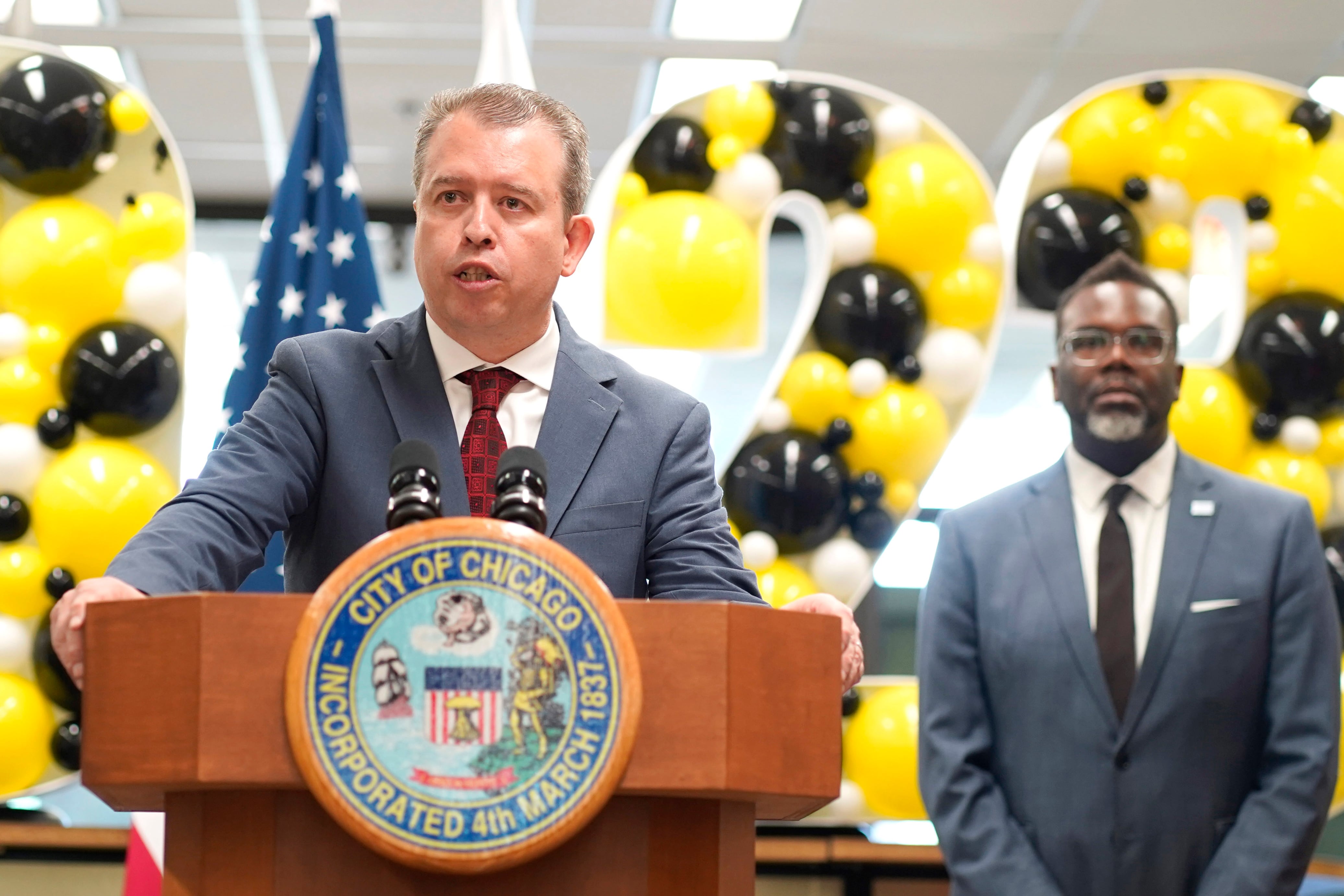Sign up for Chalkbeat Chicago’s free daily newsletter to keep up with the latest news on Chicago Public Schools.
Chicago Public Schools CEO Pedro Martinez is a finalist to be the next state commissioner of Massachusetts’ Department of Elementary and Secondary Education.
Martinez — who is set to leave CPS at the end of June after the school board voted in December to fire him without cause — is one of 42 people who applied for the job and is one of three finalists, who will all interview with the Massachusetts Board of Elementary and Secondary Education on Thursday during a public meeting. The other candidates are Jack Elsey, founder of the Michigan Educator Workforce Initiative and former chief of innovation and incubation at Chicago Public Schools, and Lily Laux, the former deputy commissioner of school programs at the Texas Education Agency.
The board is expected to choose someone at a special meeting on April 22, according to that meeting’s agenda. The board will then send its recommendation to the state’s secretary of education — who is currently serving as interim commissioner — for final approval.
Former Commissioner Jeff Riley stepped down about a year ago for personal reasons, WBUR reported.
If picked, Martinez would step into a job in a state that’s pushed back against the Trump administration’s efforts to crack down on funding and what’s taught in schools, much like Chicago and Illinois. Massachusetts state officials have blasted federal education funding cuts, signed on to a lawsuit against halting COVID relief funding for schools, and rebuffed a recent demand from the Trump administration to affirm that it will not promote diversity, equity, and inclusion efforts. Last week, the interim education commissioner wrote that Massachusetts follows federal laws and will “continue to promote diversity.”
It’s at least the second job in public education that Martinez has sought since he was fired in December. In February, Martinez was one of six candidates in the running for a job as superintendent of Clark County School District in Nevada, which includes Las Vegas, but didn’t make it to the final round of interviews.
Chicago Public Schools declined to comment.
The Massachusetts board hired a search firm earlier this year to find its next commissioner. The board must choose someone for the role with a two-thirds approval vote, then recommend that choice to the state’s education secretary, an advisor to the governor who will approve or reject that recommendation.
The Massachusetts role would involve overseeing the state’s roughly 400 school districts, which in total enroll more than 914,000 students, according to state data. CPS is a district with roughly 324,000 students enrolled at more than 600 schools.
Many of Massachusetts’ demographics differ from those of Chicago Public Schools, where 47% of kids are Hispanic, 35% are Black, 11% are white and 4.7% are Asian American. Across Massachusetts, more than half of kids in public school are white, another quarter are Hispanic, 10% are Black, and 7.5% are Asian American, according to state data.
Nearly 21% of students have disabilities, 14% are English learners, and 42% of students come from low-income households across Massachusetts, data show. In Chicago, nearly 72% of kids come from low-income families, 27% are English learners, and 16% have disabilities.
With Martinez on the way out, Chicago’s Board of Education must find a new leader too. The board has hired a search firm and recently passed a resolution requiring the next head of CPS to have a superintendent’s license. Illinois law currently exempts the CPS CEO from that requirement.
Martinez’s firing followed months of disagreement with City Hall and Mayor Brandon Johnson on how to pay for new labor contracts and other costs as the district faces major financial challenges. Amid that dispute, Johnson’s entire appointed school board stepped down in October.
Before Chicago, Martinez was the superintendent of San Antonio Independent School District. Earlier in his career, he worked for the Nevada Department of Education as an education policy advisor.
From 2012 to 2014, he was the superintendent of Washoe County School District in Reno, Nevada — a job he was also fired from for allegedly misrepresenting himself as an accountant, the Reno Gazette Journal reported. Martinez said he did not misrepresent himself and later filed a wrongful termination lawsuit, which was settled for $500,000, and the school board said it only meant to put Martinez on an administrative leave, according to the Gazette Journal.
This story has been updated to note CPS declined to comment.
Reema Amin is a reporter covering Chicago Public Schools. Contact Reema at ramin@chalkbeat.org.





